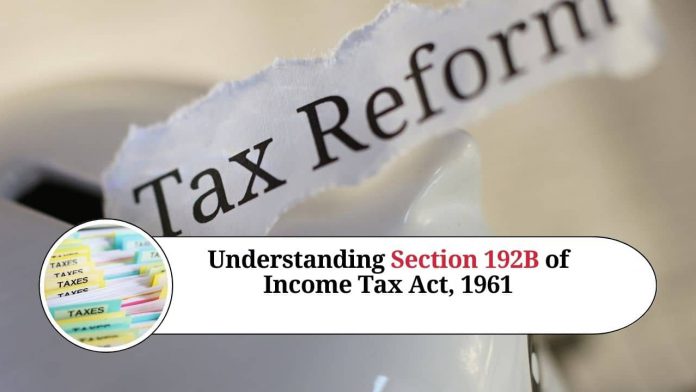The Indian Income Tax Act, 1961, is a complex document with numerous sections and subsections. Section 192B is one such provision that taxpayers need to be aware of to comply with the Income Tax regulations. In this blog, we will discuss what Section 192B entails and its implications for taxpayers.
What is Section 192B of Income Tax Act, 1961?
Section 192B is a provision that was inserted into the Income Tax Act, 1961, by the Finance Act, 2015. The section requires an employer to deduct tax at the rate of 2% from the salary of an employee for the Financial Year 2015-16 onwards, if the employee’s taxable income exceeds Rs. 2.5 lakhs per annum.
The section applies only to salaried individuals and does not affect non-salaried taxpayers. Additionally, the tax rate of 2% is not applicable to taxpayers who are eligible to file Income Tax Returns under Section 139(1) of the Income Tax Act, 1961.
Implications of Section 192B
The implications of Section 192B are significant for salaried employees. The section essentially means that if an individual’s taxable income exceeds Rs. 2.5 lakhs per annum, their employer will deduct an additional 2% tax from their salary. This provision is in addition to the existing tax deduction at source (TDS) applicable to salaried employees.
For example, if an employee’s taxable income is Rs. 3 lakhs per annum, their employer will deduct a tax of Rs. 1,000 (2% of Rs. 50,000, which is the amount exceeding Rs. 2.5 lakhs) from their salary. This additional tax will be deducted on top of the regular TDS.
However, if an employee is eligible to file their Income Tax Returns under Section 139(1), they can claim a refund of the additional tax paid under Section 192B.
Exceptions to Section 192B
There are a few exceptions to Section 192B. The section does not apply to taxpayers who are:
- Residing in a notified tribal area as per the Sixth Schedule of the Indian Constitution.
- Residents of the state of Jammu and Kashmir.
- Residents of the state of Meghalaya.
- Members of the Armed Forces who are serving in areas that are notified as disturbed areas under the Income Tax Act, 1961.
In conclusion
Section 192B of the Income Tax Act, 1961, is an important provision that salaried employees need to be aware of. The section mandates an additional 2% tax deduction on top of the regular TDS for taxpayers whose taxable income exceeds Rs. 2.5 lakhs per annum. However, taxpayers who are eligible to file their Income Tax Returns under Section 139(1) can claim a refund of the additional tax paid under Section 192B. As such, it is essential to understand the provisions of Section 192B to avoid any surprises in tax deductions and to comply with the Income Tax regulations.
Other Related Blogs: Section 144B Income Tax Act
Frequently Asked Questions (FAQs)
Q.1 What is Section 192B of Income Tax Act, 1961?
Section 192B is a provision inserted by the Finance Act, 2015 that mandates an additional 2% tax deduction on top of the regular TDS for salaried taxpayers whose taxable income exceeds Rs. 2.5 lakhs per annum.
Q.2 Who is liable to deduct tax under Section 192B?
Employers are liable to deduct tax under Section 192B.
Q.3 Does Section 192B apply to all taxpayers?
No, Section 192B applies only to salaried taxpayers whose taxable income exceeds Rs. 2.5 lakhs per annum.
Q.4 What is the tax rate under Section 192B?
The tax rate under Section 192B is 2%.
Q.5 Is the tax rate under Section 192B applicable to taxpayers who file their Income Tax Returns?
No, the tax rate under Section 192B is not applicable to taxpayers who are eligible to file their Income Tax Returns under Section 139(1).
Q.6 Can taxpayers claim a refund of the additional tax paid under Section 192B?
Yes, taxpayers who are eligible to file their Income Tax Returns under Section 139(1) can claim a refund of the additional tax paid under Section 192B.
Q.7 Are there any exceptions to Section 192B?
Yes, Section 192B does not apply to taxpayers who are residing in a notified tribal area, residents of the state of Jammu and Kashmir, residents of the state of Meghalaya, and members of the Armed Forces who are serving in disturbed areas notified under the Income Tax Act, 1961.
Q.8 When was Section 192B introduced?
Section 192B was introduced by the Finance Act, 2015 and is applicable from the Financial Year 2015-16 onwards.




















